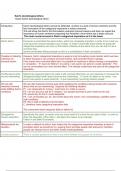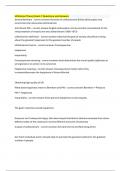Utilitarians - Study guides, Class notes & Summaries
Looking for the best study guides, study notes and summaries about Utilitarians? On this page you'll find 99 study documents about Utilitarians.
Page 4 out of 99 results
Sort by

-
Michael Sandel's Justice Summary Justice: What's the Right Thing to Do?
- Summary • 17 pages • 2022
-
- $14.79
- 2x sold
- + learn more
Michael Sandel's Justice Summary Justice: What's the Right Thing to Do? Michael Sandel's Justice Summary Justice: What's the Right Thing to Do? Principle of utility Whatever produces pleasure or happiness and whatever prevents pain or suffering. Cost-benefit analysis A calculation system used by utilitarians that translates all costs and benefits into monetary terms in order to compare. Ex: measuring the effects of smoking on the Czech national budget - gov't gains more money th...
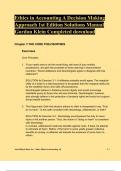
-
Ethics in Accounting A Decision Making Approach 1st Edition Solutions Manual Gordon Klein Completed download
- Exam (elaborations) • 14 pages • 2024
-
- $15.99
- + learn more
Chapter 3 THE CORE PHILOSOPHIES Exercises Core Principles 1. “If you really want to do the moral thing, sell most of your worldly possessions, and give the proceeds to those starving in impoverished countries.” Would utilitarians and deontologists agree or disagree with this statement? SOLUTION for Exercise 3-1: A utilitarian probably would agree. The marginal utility of a dollar to a starving person is far greater than the marginal utility lost by the wealthier donor who...
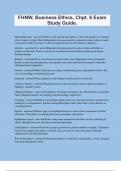
-
FHNW, Business Ethics, Chpt. 6 Exam Study Guide.
- Exam (elaborations) • 3 pages • 2024
-
- $10.49
- + learn more
FHNW, Business Ethics, Chpt. 6 Exam Study Guide. Moral philosophy - answerrefers to the specific principles or values that people use to decide what is right or wrong. Moral philosophies are person-specific, whereas business ethics is based on decisions made by groups or when carrying out tasks to meet business objectives. Idealism - answeris a moral philosophy that places special value on ideas and ideals as products of the mind. There is a positive correlation between idealistic thinking...
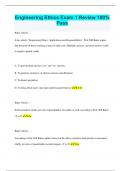
-
Engineering Ethics Exam 1 Review 100% Pass
- Exam (elaborations) • 11 pages • 2023
- Available in package deal
-
- $9.99
- + learn more
Engineering Ethics Exam 1 Review 100% Pass Baker Article --- In his article, "Engineering Ethics: Applications and Responsibilities", Prof. Bill Baker argues that the goals of those teaching courses in ethics are: (Multiple answers, incorrect answers result in negative partial credit) A. To provide hard and fast "yes" and "no" answers. B. To generate awareness of ethical concerns and dilemmas C. To disarm prejudices D. To bring about more value laden professional behavior B C D Baker...
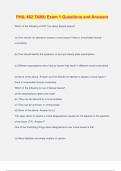
-
PHIL 482 TAMU Exam 1 Questions and Answers
- Exam (elaborations) • 9 pages • 2024
- Available in package deal
-
- $13.49
- + learn more
PHIL 482 TAMU Exam 1 Questions and Answers Which of the following is NOT true about factual issues? (a) One should not attempt to assess a moral issue if there is irresolvable factual uncertainty. (b) One should identify the questions of fact and clearly state assumptions (c) Different assumptions about factual issues may result in different moral conclusions (d) None of the above -Answer-(a) One should not attempt to assess a moral issue if there is irresolvable factual uncertainty Whic...
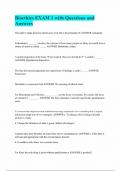
-
Bioethics EXAM 1 with Questions and Answers
- Exam (elaborations) • 6 pages • 2024
-
Available in package deal
-
- $7.99
- + learn more
Bioethics EXAM 1 with Questions and Answers The right to make decisions about one's own life is the principle of? ANSWER Autonomy In Bentham's _______ calculus, the criterion of how many people are likely to benefit from a course of action is called _____. ANSWER Hedonistic, extent. A moral proposition of the form "If you want X, then you should do Y" is called a ______. ANSWER Hypothetical Imperative. The idea that moral judgements are expressions of feelings is called _...

-
• Test Bank for Ethics, Jurisprudence and Practice Management in Dental Hygiene 3rd Edition by Kimbrough Latest Updated 2023 • Rated Grade A+ • Test Bank for Ethics, Jurisprudence and Practice Man
- Exam (elaborations) • 41 pages • 2023
-
- $23.49
- + learn more
• Test Bank for Ethics, Jurisprudence and Practice Management in Dental Hygiene 3rd Edition by Kimbrough Latest Updated 2023 • Rated Grade A+ • Test Bank for Ethics, Jurisprudence and Practice Management in Dental Hygiene 3rd Edition by Kimbrough Chapter One Test Name Multiple Choice/True-False: 1. Utilitarianism is concerned with a. rights. b. duties. c. happiness. ...
Kant's deontological ethics essay plan Utilitarianism- essay plan Meta-Ethics essay plan
Utilitarian Theory Exam 1 Utilitarian Theory Exam 1 questions and 100% correct answers
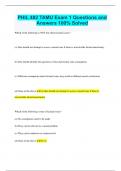
-
PHIL 482 TAMU Exam 1 Questions and Answers 100% Solved
- Exam (elaborations) • 13 pages • 2023
- Available in package deal
-
- $9.99
- + learn more
PHIL 482 TAMU Exam 1 Questions and Answers 100% Solved Which of the following is NOT true about factual issues? (a) One should not attempt to assess a moral issue if there is irresolvable factual uncertainty. (b) One should identify the questions of fact and clearly state assumptions (c) Different assumptions about factual issues may result in different moral conclusions (d) None of the above (a) One should not attempt to assess a moral issue if there is irresolvable factual uncertainty Wh...

How did he do that? By selling his study resources on Stuvia. Try it yourself! Discover all about earning on Stuvia



